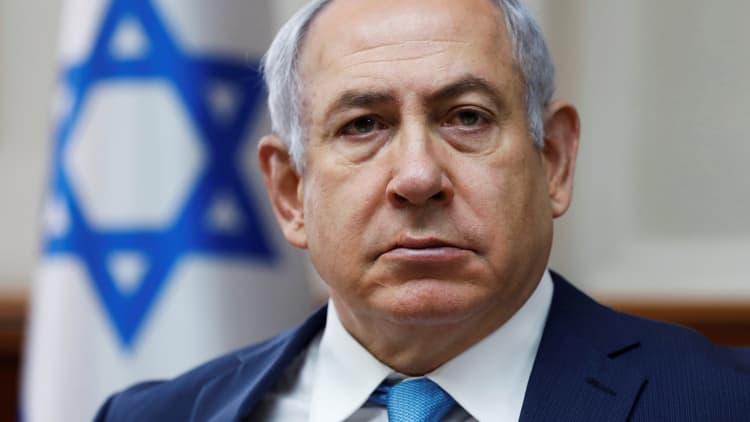
Iran's bold rocket assault on Israeli forces Thursday signals an unwillingness to just take a diplomatic approach to the U.S. exit from the nuclear agreement, and it's likely to do everything it can to get around sanctions.
Israeli jets struck dozens of Iranian targets in Syria, following the Iranian rocket attack on Israeli forces in the Golan Heights, which Israel described as unsuccessful. The incident, however, was the first direct military exchange between the two countries ever and could be a warning of escalating interactions.

Whether a direct response or not to President Donald Trump's abandonment of the nuclear agreement, Iran's action may also be a sign of a divide in Iran. While President Hassan Rouhani has said Iran will seek to stay in the nuclear agreement if it can, the attack on Israel was carried by the Iranian Revolutionary Guard Corps, who take orders from the supreme leader, Ayatollah Ali Khamenei.
"This is a real escalation. This is significant and the retaliation by Israel was not small potatoes," said John Kilduff of Again Capital. "It feels like we're on the brink of war. I think Rouhani has lost the support of the supreme leader and the IRGC is back in ascendancy."
Trump announced Tuesday that the U.S. is dropping out of the Iran nuclear deal, ending a waiver on sanctions that crippled Iran's economy and hampered its ability to export oil after they were put in place in 2012. The sanctions are being restored immediately, and companies have 90 to 180 days to stop doing business with Iran.
"Iran will be very resourceful in circumventing the sanctions. I think they have willing counterparties in that effort. China for sure, Russia and India," said Kilduff.

Rouhani on Tuesday said Iran would speak with the other members of the 2015 nuclear deal — China, Russia, Germany, the U.K. and France — to see if it can be maintained without the U.S. However, if the deal collapses, Iran could return to its nuclear program.
But Khamenei said while Iran wants to continue the nuclear deal, he doesn't trust the U.K., France or Germany. He did not mention China and Russia.
Russia says it intends to stay in the nuclear deal despite the U.S., and the Kremlin separately called on Israel and Iran to ease tensions and seek a diplomatic solution.
Assessing the impact of new sanctions
Khamenei also made threatening comments aimed at Trump, saying he's made a big mistake and Trump will be "worm food" while the Iranian republic is still standing.
Trump this week called the agreement "disastrous," and promised the "highest level of economic sanctions against Iran."
But longer term, analysts also say the bigger issue is the schism in Iranian internal politics, and who ultimately gains the upper hand.
"Rouhani doesn't control the nuclear field. The supreme leader does. What does the supreme leader do now? I think the biggest risk is the hard-liners in Iran get the upper hand, and Iran resumes their nuclear program. I think Rouhani may have been discredited today," said Helima Croft, global head of commodity strategy at RBC Capital Markets.
As analysts assess what impact renewed sanctions may have, they point to the fact that China is unlikely to curtail its purchases of Iranian oil, and may in fact increase them. Iran is also likely to find an ally in Russia, also under U.S. sanctions.
Iran could first explore diplomatic channels after Trump's decision to resume sanctions on the country based on evidence from Israel that Iran is continuing a nuclear program and its support of terrorist organizations in the Middle East. But while it could go to the United Nations General Assembly, the U.S. sits on the Security Council.
U.N. Secretary-General Antonio Guterres said he was deeply concerned by the U.S. action.
Analysts expect European companies that do not want to be prohibited from dealing with the U.S. to comply with the renewed sanctions, but European leaders are expected to continue to work to find a way to keep the pact in place.
"While there is considerable debate over the effectiveness of unilateral U.S. action on Iran, we think that a revival of the threat to lock noncompliant corporates out of U.S. capital markets provides the White House with a pretty powerful stick," notes Croft. "While Chinese compliance is probably a nonstarter, we do anticipate a high degree of cooperation from European, Japanese and South Korean corporates despite their host government's opposition to the U.S. move."
French President Emmanuel Macron tweeted that there will be a continued effort to work on a broader framework to include lengthening the nuclear agreement and curbing ballistic missiles and Iranian activity in Yemen and Syria.
Carlos Pascual, a former U.S. diplomat and the State Department's top energy official when the sanctions were first imposed, said one way forward could be a parallel set of sanctions that the U.S. could agree to with Europe on the topics mentioned by Macron.
"I imagine what will happen is the administration will continue some form of discussion or dialogue with the Europeans on whether there are supplementary sanctions that could be put in place on ballistic missiles. It's unclear what might be done to constrain Iran in the region," said Pascual, a senior vice president at IHS Markit.
He said Iran's activity in the region extends to Hezbollah and Hamas, and into places like Syria, Libya, Lebanon and Yemen.
"Sanctions on Iran's involvement in the region become complicated because they are so extensive, and they are hard to measure and verify. It would be extremely difficult to implement," said Pascual.
According to U.S. and allied intelligence, there are an estimated 40,000 Iranian troops and militia on the ground in Syria, and as many as 2,500 Iranians, including high-ranking generals, have been killed there.
"There's no question that Iran's regional behavior has been intrusive and self interested as they've tried to deepen and expand their involvement in Syria to be able to advance Iranian interests, in particular to make sure they maintain a direct linkage to Hezbollah in Lebanon," Pascual said. "That's their principle mechanism of wreaking havoc on Israel."
Iran learned to get around sanctions the last time, and it could do so again but more successfully, analysts said. Instead of the more than 1 million barrels a day that were kept off the market in the last round of sanctions, the result is likely to be somewhere between 300,000 and 500,000, since U.S. allies do not support ending the deal, known as the Joint Comprehensive Plan of Action.
Impact of 2012 Iranian oil sanctions by country
Source: RBC
"They've learned a lot over the last two years so it will be back to the cat and mouse game that they played all over the world," said Henry Rome, Eurasia Group's Iran researcher.
"The past is prologue so you return to Iran's resistance economy posture from five years ago, when they tried to survive while being cut off from international trade. I think they proved to themselves that they were able to survive," he said. Rome said Iran limped through the period of sanctions and "still came out intact. They are masters at playing a long game."
Getting around sanctions
Pascual said there are significant differences between now and when the sanctions were first imposed that could make it much easier on Iran.
"In 2012, the Europeans issued a regulatory action that required all European states to completely stop or ban the import of Iranian crude oil within six months. In 2012 Europe went from 600,000 [barrels a day] to zero," he said. "In this case the Europeans don't want to end the deal. The higher probability is the Europeans will take some reduction of 20 percent."
But as for China, it may not see a reduction at all. Instead it may buy more crude and Iran may be forced to sell it at a discount, he said.
Pascual said China's Kunlun Bank and a trading firm worked with Iran during the past period of sanctions, and even with sanctions it was able to sell oil into China. It's possible Iran could again work with "entities that are isolated from any contact with [the] U.S. financial system and most likely will continue to import Iranian crude oil which is in the range of 600,000 barrels a day."
He said its unknown how India will respond, and it's also unclear whether other countries will allow similar situations with banks and trading concerns to deal with Iran.
As for Russia, where U.S. sanctions are stinging a number of resources companies, Pascual said entities there could buy Iranian crude and swap their own back on to the world market.
"It's those types of leakages from Russia and China that are the most obvious ones where the Iranians could still find outlets to be able to export their product," he said.
But longer term, Rouhani faces his own challenges. The pact was a promise to restore the economy after it was crippled by the 2012 sanctions in an effort to get it to end its nuclear program.
"Everything you read about Iran indicates the people are very unhappy and restive and people are not cut off from the rest of the world's communications. People are violating restrictions," said Citigroup's global head of commodities research, Edward Morse. "It could well be this is what happened under the shah." The shah of Iran was overthrown in 1979 after years of unrest.
Rome said he expects Rouhani to remain until his term ends.
"Rouhani still has a few more years left in his term and I think he'll finish it out like a lame duck, like many of his predecessors, and the supreme leader will milk it and let it string out as a way to discredit Rouhani and people who share his views," Rome said.



